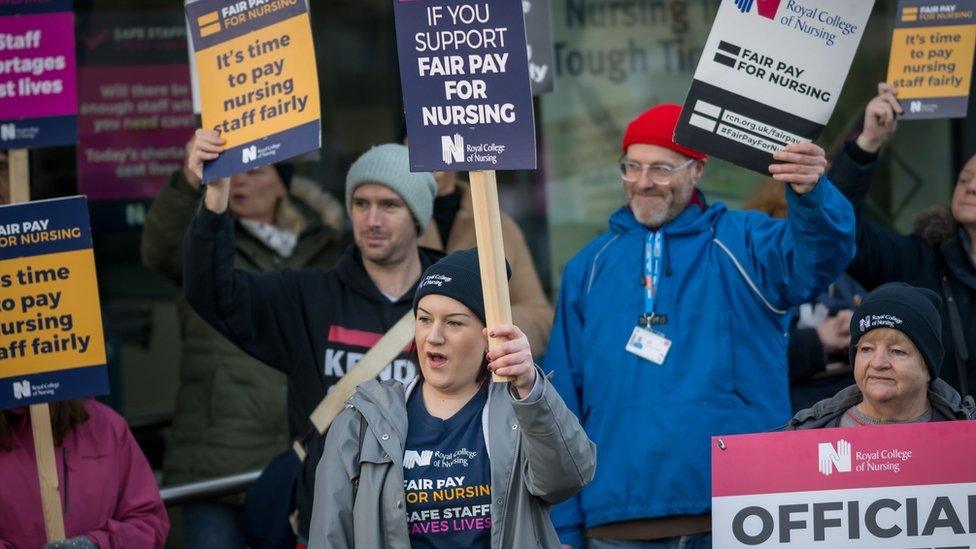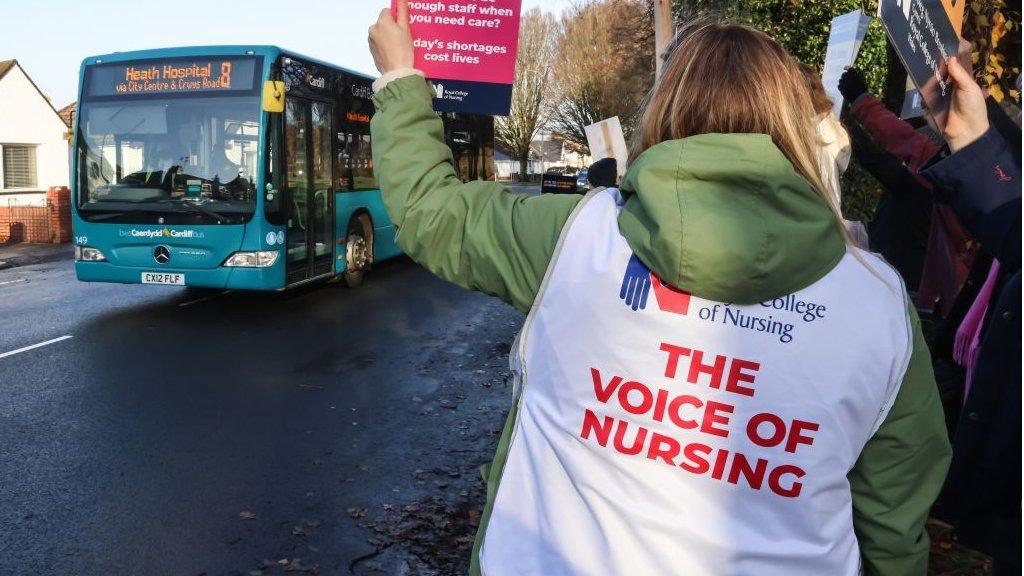Strikes: Boost union sign-up in private sector - report
- Published

Cardiff nurses on a picket line over pay
The Welsh government should help boost the membership of unions representing private sector employees, according to a report from a think-tank.
In 2021, only a fifth of private sector employees in Wales were part of a union compared with 62.4% of public sector workers, latest figures show, external.
The Institute for Welsh Affairs has called on Welsh ministers to set up a fund to increase numbers in unions.
The Welsh government said it would consider ideas to boost membership.
The figures also showed younger workers were less likely to be part of a union than their older colleagues, with 32.7% of 25 to 34-year-olds across all sectors in Wales being part of a union compared with 45.5% of workers aged 50 or over.
According to the report, external trade unions "are non-existent in many parts of the private sector in Wales".
"It is often those most in need of union representation such as young workers and those in precarious employment that are least likely to become members," the report added.
It recommended the establishment of a fund for unions to use in order to try to boost memberships, the setting of a "national milestone" for union membership and to consider seeking the devolution of powers related to regulating trade unions.
Retail worker Bethany, which is not her real name, is one of the few unionised young people working in the private sector.
She joined a trade union after seeing how a union rep visiting the shop where she works dealt with first-aid kits that had been tampered with.
"People managing the store weren't thinking about the little everyday nicks and scuffs, whereas the union rep who came in had it written down," Bethany told the BBC's Politics Wales programme on condition of anonymity.
She added: "I see it very much from older people who were raised with that union mentality, who saw the shifts it made in the '70s and early noughties, who saw what they could do.
"But then you get to my age group and it seems like the union's on the backburner.
"It just seems a lot of people have argued it's £10 [or] £15 they don't want to lose off their pay cheque, because when you're on a zero-hours contract it adds up quickly."

Minister Hannah Blythyn says trade unions should be presented as a "force for good"
Hannah Blythyn, deputy minister for social partnership, said she welcomed the report.
"The recommendations certainly look to build on the work we're already doing as a government to promote trade union membership and to work in partnership with trade unions, and to make sure that we present trade unions as a force for good," she said.
The Welsh Conservatives' spokesman for social partnership, Joel James, said there should be "higher priorities for the Welsh government" than boosting union membership numbers, including education, social mobility and health.
'Collective voice at work'
Prof Alex Bryson, of the Welsh Institute of Social and Economic Research and Data, at Cardiff University, said there were a "whole range of reasons" union membership rates were higher in the public sector than the private sector, including the size of public sector workplaces where unions can target "low-hanging fruit".
In contrast, it is "very hard" and "costly" to organise younger workers in the fast-food industry and gig economy," he added.
The Welsh TUC, the umbrella organisation for most trade unions in Wales, said unions "invest in trying to recruit younger workers across the labour market, but clearly more needs to be done so that many more people are realising their right to a collective voice at work".
"It's crucial that we have more active young trade unionists and greater collective bargaining coverage," a spokeswoman added.

THE BESTEST BITS: A little bit more of what you like from Wynne Evans

Related topics
- Published2 March 2023

- Published28 February 2023

- Published28 February 2023
